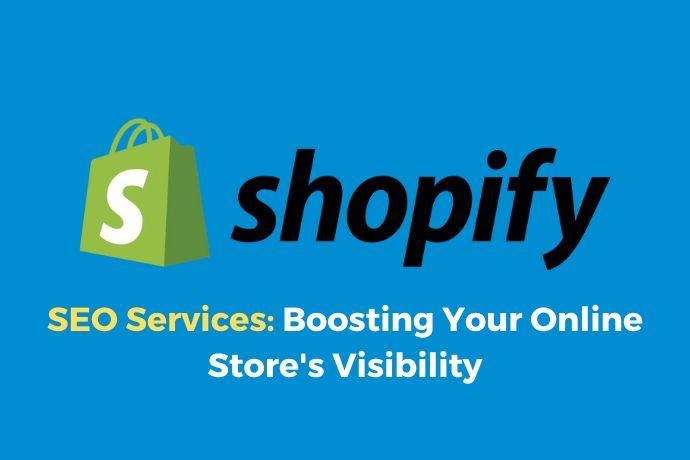Shopify SEO services optimize your online store for search engines. They help increase visibility, traffic, and sales.
Shopify offers a robust platform for eCommerce, but to maximize its potential, SEO is crucial. SEO services for Shopify involve keyword research, on-page optimization, and content creation. Experts can also enhance site speed and mobile compatibility, boosting user experience and search rankings.
These services target both technical and content aspects, ensuring your store ranks higher on search engine results pages (SERPs). Effective SEO can drive organic traffic, leading to increased conversions and revenue. Investing in Shopify SEO services can give your online store a competitive edge in the crowded eCommerce landscape.
Introduction To Shopify Seo
Shopify is a powerful platform for online stores. To succeed, you need SEO. SEO helps your store rank higher on search engines. This brings more visitors and sales.
Importance Of Seo For E-commerce
SEO is crucial for e-commerce success. It improves your store’s visibility. More visibility means more potential customers. SEO helps your products appear in search results.
- Increased Traffic: Better SEO means more visitors to your site.
- Higher Conversion Rates: Targeted traffic often leads to higher sales.
- Cost-Effective: Organic traffic is free, unlike paid ads.
How Shopify Handles Seo
Shopify offers built-in SEO tools. These tools help you optimize your store easily.
| Feature | Benefit |
|---|---|
| Automatic Sitemaps | Search engines can index your site faster. |
| Customizable Title Tags | Helps in ranking for specific keywords. |
| Meta Descriptions | Improves click-through rates from search results. |
Shopify also allows URL customization. Clean URLs improve user experience and SEO. Shopify’s mobile-friendly design helps too. Mobile optimization is a ranking factor for Google.
Keyword Research For Shopify
Keyword research is the cornerstone of effective Shopify SEO. Identifying the right keywords helps your store appear in search results. It drives organic traffic and increases sales.
Would you like to start a project with us?
Let’s elevate your digital presence together. Reach out today to begin your journey towards measurable success with Innovate Rank.
Finding Relevant Keywords
Finding relevant keywords is essential for your Shopify store. Start by brainstorming words related to your products. Think about what your customers might search for.
Use a mix of broad and specific terms. For instance, if you sell shoes, use terms like “running shoes” and “blue running shoes.” This helps you cover a wide range of search queries.
Consider the user intent behind each keyword. Are they looking to buy, learn, or compare? Tailor your keywords to match their intent.
Tools For Keyword Research
Several tools can help you find effective keywords for your Shopify store. Here are some popular options:
| Tool | Description |
|---|---|
| Google Keyword Planner | A free tool to find keywords and see their search volume. |
| Ahrefs | A premium tool offering in-depth keyword analysis and competitor insights. |
| SEMrush | A comprehensive tool for keyword research, competitive analysis, and more. |
| Ubersuggest | A user-friendly tool that provides keyword suggestions and data. |
Use these tools to gather a list of potential keywords. Analyze their search volume and competition. Focus on keywords with high volume and low competition.
Incorporate your keywords naturally into your product titles, descriptions, and metadata. This improves your Shopify store’s visibility.
On-page Seo Techniques
Effective on-page SEO techniques can significantly boost your Shopify store’s visibility. By focusing on key elements, you can enhance your site’s performance and attract more visitors.
Optimizing Product Pages
Optimizing product pages is crucial for driving organic traffic. Here are some essential steps:
- Use relevant keywords in product titles and descriptions.
- Ensure high-quality images with appropriate alt text.
- Create unique product descriptions for each item.
- Implement structured data for better search engine understanding.
Consider using a table for product specifications. This helps with readability and SEO.
| Feature | Specification |
|---|---|
| Material | 100% Cotton |
| Size | Small, Medium, Large |
| Color | Red, Blue, Green |
Crafting Compelling Meta Descriptions
Meta descriptions play a vital role in on-page SEO. They act as a preview for your page content.
- Keep it under 155 characters.
- Incorporate primary keywords naturally.
- Write a clear call-to-action.
Here’s an example of a compelling meta description:
Crafting effective meta descriptions can increase your click-through rates. Ensure each page has a unique meta description tailored to its content.

Technical Seo For Shopify
Technical SEO for Shopify is crucial for improving your store’s visibility and performance. It involves optimizing various technical aspects of your website to ensure search engines can crawl and index it effectively. This ensures a better user experience and higher rankings in search results.
Improving Site Speed
Site speed is a key factor in both user experience and SEO. A slow site can hurt your rankings and drive away customers. Here are some ways to improve your Shopify store’s speed:
- Optimize Images: Use compressed images. They load faster and save bandwidth.
- Minimize Code: Remove unnecessary code. Minified CSS and JavaScript files are faster.
- Leverage Browser Caching: Store static files in the user’s browser. This reduces load times for repeat visitors.
Mobile Optimization
More people are shopping on mobile devices. Therefore, your Shopify store must be mobile-friendly. Here are some tips for mobile optimization:
- Responsive Design: Ensure your website adapts to different screen sizes.
- Fast Load Times: Mobile users expect quick loading pages. Optimize images and scripts for mobile.
- Touch-Friendly Navigation: Use large buttons and easy-to-read fonts. This enhances the mobile user experience.
To sum up, focusing on technical SEO for your Shopify store can dramatically improve your site’s performance and user experience. By enhancing site speed and optimizing for mobile, you’ll see better rankings and happier customers.
Content Marketing Strategies
Effective content marketing strategies can significantly boost your Shopify store’s SEO. By creating valuable content, you drive traffic and improve search rankings. Let’s dive into some key strategies that can help.
Blogging For Seo
Blogging is an excellent way to enhance your Shopify SEO. Regular blog posts keep your site fresh and relevant. Search engines love fresh content. Each blog post is an opportunity to target different keywords.
Focus on writing about topics related to your products. For example, if you sell organic skincare, write about skincare routines, benefits of organic products, and customer success stories.
| Blog Topic | SEO Benefit |
|---|---|
| Skincare Routines | Targets relevant keywords |
| Organic Product Benefits | Attracts organic traffic |
| Customer Stories | Builds trust and engagement |
Creating Shareable Content
Creating shareable content helps in gaining backlinks and increasing brand visibility. People love sharing content that is useful, interesting, or entertaining.
Consider these types of shareable content:
- Infographics: Visual and easy to understand.
- Videos: Engaging and highly shareable.
- How-to Guides: Useful and informative.
- Lists: Quick to read and easy to share.
Ensure your content is easy to share. Add social sharing buttons to your blog posts. Encourage readers to share your content with their network.
By implementing these content marketing strategies, you can significantly improve your Shopify store’s SEO and drive more organic traffic.
Link Building Tactics
Link building is crucial for improving your Shopify store’s search engine ranking. Effective link-building enhances your site’s authority. Here are some key tactics to help you build quality links for your Shopify store.
Earning Quality Backlinks
Quality backlinks boost your site’s credibility and improve search engine rankings. Focus on earning links from high-authority websites. Use the following methods to earn quality backlinks:
- Create high-quality content that others want to link to.
- Engage in influencer outreach to get links from reputable sources.
- Participate in online communities and forums related to your niche.
Use tools like Ahrefs or Moz to identify potential link opportunities. Track your backlinks and their impact on your SEO.
Guest Posting Opportunities
Guest posting is another effective link-building tactic. It involves writing articles for other websites. This helps you gain exposure and quality backlinks. Follow these steps to find guest posting opportunities:
- Identify websites in your niche that accept guest posts.
- Read their guidelines carefully before submitting your content.
- Offer valuable, unique content that fits their audience.
Ensure your guest posts include a link back to your Shopify store. Use keywords in your anchor text to improve SEO. Guest posting builds relationships and enhances your site’s authority.
Local Seo For Shopify Stores
Local SEO is essential for Shopify stores targeting specific areas. By optimizing your store for local searches, you attract nearby customers. This enhances your visibility in local search results. Below are key strategies for local SEO success.
Setting Up Google My Business
First, set up a Google My Business (GMB) profile. This helps your store appear in local search and Google Maps. Follow these steps:
- Create a Google account.
- Go to Google My Business.
- Click “Manage now” and follow the prompts.
- Enter your business name, address, and phone number.
- Choose a relevant category.
- Verify your business via mail, phone, or email.
Ensure your GMB profile is complete and accurate. Include your business hours, photos, and services. Encourage customers to leave reviews. Respond to reviews promptly to boost engagement.
Targeting Local Keywords
Targeting local keywords is crucial for local SEO. Use keywords that include your city or neighborhood. Here’s how to find the best local keywords:
- Use tools like Google Keyword Planner.
- Analyze competitor keywords with SEMrush or Ahrefs.
- Include keywords in your product titles and descriptions.
- Use local keywords in your blog posts and meta tags.
For example, if you own a bakery in Brooklyn, use keywords like “Brooklyn bakery” or “best cupcakes in Brooklyn”. This helps local customers find your store.
| Page Element | Optimization Tips |
|---|---|
| Title Tags | Include local keywords. |
| Meta Descriptions | Write compelling descriptions with local keywords. |
| Headings | Use H1, H2, and H3 tags with local keywords. |
| Content | Write naturally but include local keywords. |
| URL Slugs | Use short, descriptive, and local keyword-based URLs. |
Local SEO can significantly boost your Shopify store’s visibility. By setting up Google My Business and targeting local keywords, you attract more local customers.
Measuring Seo Success
Measuring the success of your Shopify SEO services is crucial. You need to know if your efforts are paying off. This section will guide you on how to track and measure your SEO performance effectively.
Using Google Analytics
Google Analytics is a powerful tool for tracking your SEO success. It provides detailed insights into your website’s performance. Setting up Google Analytics is simple and free.
To start, create a Google Analytics account. Then, add your Shopify store. Follow these steps:
- Sign up or log in to Google Analytics.
- Click on “Admin” and select “Create Account”.
- Enter your account and website name.
- Copy the tracking code and paste it into your Shopify store.
Once set up, you can monitor various metrics.
Tracking Key Metrics
Tracking key metrics is essential for measuring SEO success. Focus on the following:
- Organic Traffic: Check the number of visitors from search engines.
- Bounce Rate: Measure how many visitors leave quickly.
- Conversion Rate: Track the percentage of visitors who make purchases.
- Average Session Duration: See how long visitors stay on your site.
- Top Landing Pages: Identify which pages attract the most traffic.
Use these metrics to assess your SEO performance. Adjust your strategy based on the data.
| Metric | Description | Importance |
|---|---|---|
| Organic Traffic | Number of visitors from search engines | High |
| Bounce Rate | Percentage of visitors who leave quickly | Medium |
| Conversion Rate | Percentage of visitors who make purchases | High |
| Average Session Duration | Time visitors spend on the site | Medium |
| Top Landing Pages | Pages with the most traffic | High |
Regularly check these metrics. This helps you understand your SEO efforts. Make data-driven decisions to improve your Shopify store’s performance.
Common Seo Mistakes To Avoid
Avoiding common SEO mistakes is crucial for the success of your Shopify store. Many store owners unknowingly make errors. These mistakes can harm their search engine rankings. Below, we discuss some of the frequent mistakes and how to avoid them.
Overusing Keywords
Overusing keywords, also known as keyword stuffing, can hurt your SEO. Google detects excessive keyword use and may penalize your site. This leads to lower rankings. Instead, use keywords naturally. Aim for a keyword density of 1-2%. This keeps your content readable and effective.
Here is a simple example:
Correct: Our Shopify SEO services help improve your online store.
Incorrect: Our Shopify SEO services, Shopify SEO strategies, and Shopify SEO tools are top-notch.
Ignoring Mobile Users
Ignoring mobile users is another common mistake. More people use mobile devices to shop online. If your store isn’t mobile-friendly, you lose potential customers. Ensure your Shopify store is responsive. Test it on various devices.
Consider these tips for a mobile-friendly site:
- Use a responsive theme.
- Optimize images for faster loading.
- Simplify navigation.
- Ensure buttons are easy to tap.
Also, check your site’s speed. A slow site frustrates users and lowers your rankings.

Future Trends In Shopify Seo
The world of Shopify SEO is constantly evolving. Keeping up with the latest trends is essential for success. In this section, we will discuss two emerging trends: Voice Search Optimization and AI and Machine Learning.
Voice Search Optimization
Voice search is growing rapidly. More people are using smart speakers and voice assistants. This shift is changing how users search for products.
- People use natural language in voice searches.
- Questions are common in voice queries.
- Long-tail keywords become more important.
Optimizing for voice search involves:
- Using conversational keywords.
- Creating FAQ pages.
- Ensuring fast loading times.
By focusing on these strategies, Shopify stores can capture voice search traffic.
Ai And Machine Learning
AI and Machine Learning are transforming SEO. These technologies help analyze vast amounts of data.
| Feature | Benefit |
|---|---|
| Automated Keyword Research | Finds high-performing keywords quickly. |
| Content Personalization | Delivers tailored content to users. |
| Predictive Analytics | Anticipates future trends and behaviors. |
AI tools can also optimize product descriptions. This ensures content is relevant and engaging. Machine learning algorithms improve search rankings by analyzing user behavior.
By adopting these technologies, Shopify stores can stay ahead in SEO.
Frequently Asked Questions
Does Shopify Provide Seo Services?
Shopify provides built-in SEO features. They help optimize your online store for search engines, improving visibility and rankings.
How Much Does Shopify Seo Cost?
Shopify SEO costs can vary. Basic services start around $500 per month. Comprehensive plans can exceed $5,000 monthly. Pricing depends on the scope and agency.
Is Shopify Any Good For Seo?
Yes, Shopify is good for SEO. It offers built-in SEO features and tools. Customizable URLs, meta tags, and mobile optimization enhance rankings.
What Is The Best Seo Tool For Shopify?
The best SEO tool for Shopify is Plug in SEO. It optimizes meta tags, keywords, and site speed effectively.
What Are Shopify Seo Services?
Shopify SEO services optimize your online store’s visibility on search engines to drive more organic traffic.
Why Is Shopify Seo Important?
Shopify SEO improves your store’s search engine ranking, leading to increased visibility and sales.
How Do Shopify Seo Services Work?
They analyze your site, optimize keywords, improve site speed, and enhance user experience for better rankings.
Can Shopify Stores Rank On Google?
Yes, with proper SEO strategies, Shopify stores can rank high on Google search results.
Would you like to start a project with us?
Let’s elevate your digital presence together. Reach out today to begin your journey towards measurable success with Innovate Rank.
Conclusion
Enhance your Shopify store’s visibility with expert SEO services. Boost traffic, improve rankings, and drive sales. Invest in professional SEO strategies today. Achieve long-term success and stay ahead of the competition. Transform your online presence with tailored Shopify SEO solutions.
Watch your business thrive and grow exponentially.

